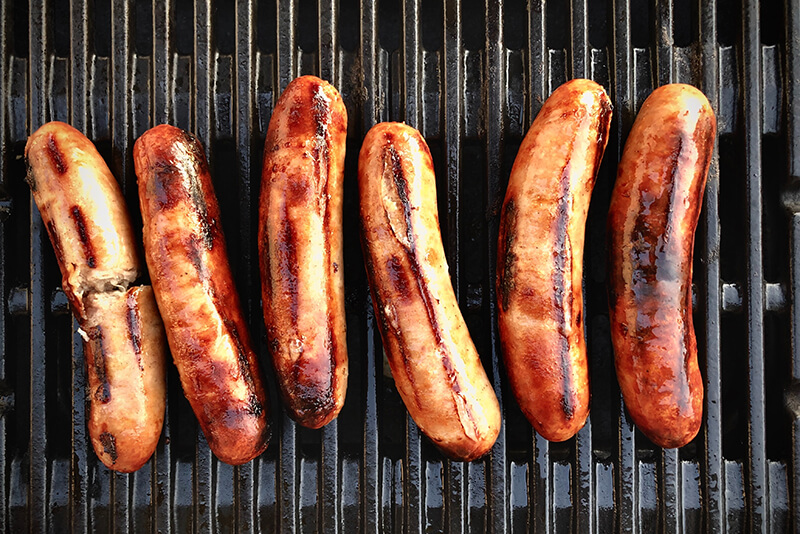There are a lot of people who love kielbasa sausage, but you should be careful when you eat it near a dog. Kielbasa is not considered safe for animal consumption because it contains additives, seasonings, and other harmful components. Also, it doesn’t have enough nutrients for a healthy dog diet, so it’s not the kind of food your dog needs.
This article will talk about kielbasa, its nutrients, and what it is made of. It will also say why dogs shouldn’t eat it.
Seeing your dog eyeing your kielbasa with interest, you might wonder – can dogs eat polish sausage? With its meaty flavor, a bite of kielbasa seems like it would make a tasty treat for your pooch. But before sharing a piece, it’s important to understand the potential risks of feeding dogs human foods like polish sausage.
In this article, we’ll explore what exactly kielbasa and other polish sausages contain their impact on your dog’s health, and safer ways to give your furry friend a flavorful meaty snack.
What is Kielbasa and Polish Sausage?
Kielbasa is a type of Polish sausage. It originated as a smoked pork sausage but now often incorporates beef or other meats too. The word “kielbasa” means “sausage” in Polish.
Some key features of kielbasa and other Polish sausages:
- Made from coarsely ground pork, beef, turkey, chicken or combinations
- Seasoned with garlic, pepper, mustard seed, coriander and other spices
- Cured, smoked or fresh varieties available
- High in fat compared to many other types of sausage
Kielbasa can be purchased pre-cooked or raw. Other popular Polish sausages similar to kielbasa include kabanos and krakowska.
Potential Health Risks of Kielbasa for Dogs
So should you let your dog nibble on a piece of your kielbasa? There are a few reasons why it may be best to avoid sharing this fatty salty sausage
Too Much Fat
Kielbasa contains a very high fat content, ranging from 30% to as high as 60% fat depending on the recipe. Too much fatty food can lead to obesity and pancreatitis in dogs. The rich kielbasa could also trigger stomach upset, vomiting or diarrhea.
Excessive Sodium
Like many processed meats, kielbasa is very high in sodium. Too much salt can cause excessive thirst, elevated blood pressure and kidney problems in canines.
Spices Like Garlic
Spices like garlic and onion are sometimes used to season kielbasa, especially homemade varieties. These contain compounds that can damage your dog’s red blood cells and cause anemia when eaten in large amounts.
Sulfites, Nitrates and Nitrites
These chemical preservatives are often added to cured or smoked kielbasa to extend shelf life and keep the sausage looking fresh. While considered safe for humans in moderation, they may pose higher risks for dogs.
Raw Pork Concerns
Raw or undercooked pork should always be avoided due to the potential for transmitting parasites and bacteria like trichinosis and salmonella. Only feed your dog fully cooked kielbasa.
Healthier Meat-Based Snacks for Dogs
Rather than Polish sausage, consider these healthier meat treats for your pooch:
Lean Baked Chicken or Turkey
Skinless white meat poultry makes a wholesome low-fat protein snack. Bake or boil it plain without any seasoning. Cut or shred into bite-size pieces.
Beef or Pork Cubes
Lean cuts of beef or pork can give your dog that satisfying red meat flavor. Remove all visible fat before cooking thoroughly. Cut into small cubes to serve.
Freshpet Dog Food Rolls
These minimally processed rolls contain fresh meats like chicken, turkey, beef or salmon. They have limited ingredients and come in dog-friendly cuts and flavors.
Canned Dog Food
High quality canned dog foods from brands like Wellness CORE provide tender meat chunks in gravy. Look for options labelled “95% meat” with no artificial additives or by-products.
Dental Chews
Virbac C.E.T. Enzymatic Oral Hygiene Chews help clean teeth while satisfying chewers. They come in poultry, beef and fish flavors.
Serving Human Food to Your Dog
While an occasional scrap from your plate likely won’t harm your dog, there are some risks with feeding “people food.” Human foods should only make up 10% or less of your dog’s diet. Too much can lead to nutritional deficiencies or imbalances when they crowd out your dog’s regular food.
Introduce new treats slowly and watch for any signs of an upset stomach. Always avoid known toxins like chocolate, grapes/raisins, macadamia nuts, xylitol and alcohol. Onions, garlic and raw meat may also be unsafe depending on the amount.
Check with your vet if you have any concerns about a particular human food you want to share with your pet. They can advise you on preparation, portion sizes and potential risks.
The Verdict on Kielbasa for Dogs
Can dogs eat polish sausage like kielbasa? In small amounts, kielbasa likely won’t seriously harm your otherwise healthy dog. But there are healthier meat-based alternatives without the high fat, salt and chemicals found in most kielbasa recipes.
While an occasional nibble of this seasoned sausage may be fine, it shouldn’t become a regular treat. Kielbasa is difficult for dogs to digest and risks causing obesity, stomach upset and other issues – especially if large amounts are consumed.
For a safer way to give your dog a flavorful meat snack, opt for lean baked chicken, turkey or beef instead. Check with your vet if you’re unsure about any human food you want to share with your four-legged friend.

k
Is It Healthy for Your Dog to Eat Kielbasa?
Besides not having the nutritional benefits, kielbasa is unhealthy for your dog. Due to its ingredients, it could cause multiple problems, such as salt toxicity, garlic toxicity, and high cholesterol.
Due to its high sugar content, eating a lot of kielbasa can also make you fat, which can lead to diabetes.
Obesity is a serious health problem caused by an increase in body weight in your dog. When a dog is obese, they can develop an array of issues, such as:
- Pancreatitis
- Arthritis
- Respiratory compromise
- Abnormal response to insulin
- Decreased heat tolerance
- Joint pain
You can easily notice obesity by noticing the significant weight gain in your dog. You should also watch out for other signs, such as a lack of energy and a desire to work out.

Regularly consuming kielbasa could result in obesity and then diabetes in your canine. This is a condition in which your dog’s body is incapable of producing enough insulin. If your dog has diabetes, they will probably need to be treated for the rest of their lives in order to stay healthy.
Common signs of diabetes in dogs include:
- Increased urination
- Increased appetite
- Increased thirst
- Weight loss
- Lethargy
- Dehydration
How Should Your Dog’s Diet Look?
For your dog to be healthy and develop properly, it’s essential to provide them with the right diet. Dogs are technically carnivores, and their main food source should come from animal protein. However, they also like to consume various omnivorous foods, including fruits and veggies.
Besides protein, they need the proper amounts of fat, carbohydrates, minerals, and vitamins, especially at a young age. Their diet should be well-balanced and include everything that they need to grow healthy and strong.
Dry or wet dog food should be the main thing that most dogs eat every day because it has all the nutrients they need to grow and stay healthy. As much as 10% of their daily diet can be treats or other safe foods, like fruits and vegetables that are safe for dogs.
Chicago’s Best Polish Sausage: Big Frank’s Sausage
FAQ
Is Polish sausage safe for dogs?
What kind of sausage can dogs eat?
What happens if my dog eats bratwurst?
Is Polish sausage safe to eat raw?
Can dogs eat kielbasa?
If your dog regularly consumes a large amount of kielbasa, he may experience mild to severe digestive issues, bloat, kidney damage, or pancreatitis. Avoid feeding your dog any meat that is processed with seasonings such as onion or garlic powder as they are toxic to your dog.
Can dogs eat sausage?
Unfortunately, there aren’t really any nutritional benefits to letting your pup eat sausage. Yes, dogs need meat and require protein to stay healthy, but the negatives of sausage far outweigh the protein boost your pet would get. What are those negatives? For starters, sausages are high in fat, which is unhealthy for your pet.
Can dogs eat bratwurst sausage?
Dogs should not eat bratwurst sausages because they contain a high level of fat, salt, garlic, and nutmeg. Summer sausages refer to any type of sausages that don’t need to be refrigerated until opening. They are usually a mix of pork, beef, or venison. Summer sausages are often dried or smoked and usually use curing salt to help preserve them.
Can dogs eat turkey sausage?
Although they are comparatively lower in calories and fat, turkey sausages are not good for dogs to eat. In addition, they are high in salt and commonly contain nutmeg, garlic, and onions as seasonings, which are terrible for dogs. Pork sausages are made by mixing ground pork meat with salt, fat, seasonings, preservatives, and fillers.
